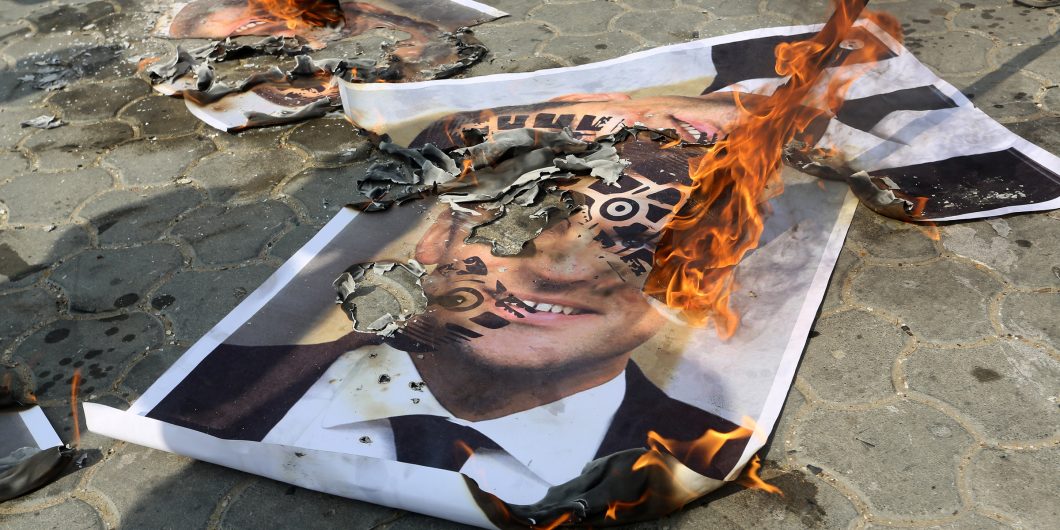What ought we to make of Beijing’s provocations in the South China Sea?
E Pluribus Nihil
It is reasonably obvious the People’s Republic of China is engaging in genocide—or something close to—of its Muslim Uyghur population. Everything from concentration camps to mass sterilisation to adverts for “beautiful” female slaves in Xinjiang papers has done the rounds. Sometimes the stories are doubted at first—being alert to WWI-style atrocity propaganda is always wise—but in each case, the rumour has been confirmed by reputable news outlets and national governments across the political spectrum and around the world.
It’s also reasonably obvious no Muslim-majority country anywhere has emitted a peep in protest, and that beyond perfunctory diplomatic representations, no Western government—with the partial and limited exception of Donald Trump popping off in his own inimitable way—has had much to say either.
I’m not a foreign policy wonk, I’m a constitutional law wonk. You will see me writing about the UK’s prerogative power and its relationship with Brexit, or the federal issues arising out of, say, Australia’s COVID-19-induced state border closures. When I write such things, I do my best to be as frank as I can. This is borne of legal training and practice. Lawyers must provide sound advice to clients, which takes in admissions where a case is weak, comments on whether litigation is wise (usually no; keeping people out of court is preferable), and—most crucially—an accurate statement of the facts in the instant case. Once a lawyer, always a lawyer, I suppose.
To that end, I’m going to bring my lawyer to foreign policy, on the basis that someone needs to state some obvious truths. I have no “foreign policy establishment” to please.
On the matter of Islamic quiescence in the face of Chinese butchery: only some of this is because the countries in question know their own human rights records are lamentable and to criticise China is to invite prying eyes closer to home. Likewise, only some of it is to do with being bought and paid for by China’s Belt and Road infrastructure and regional development programme.
Much of the supine response, I’m afraid, is because China could turn (and would, if pushed) the entire Islamic world into a grease spot without breaking sweat, and with little in the way of resistance from a now energy-independent West. Even the strongest Muslim countries like Pakistan and Turkey know this. Meanwhile, the Arab petrostates and Iran are on their uppers thanks to a combination of COVID-19, global climate change policies, and the fact that the US, Australia, and Canada have turned themselves into energy behemoths.
Contrast, too, how Australia’s Scott Morrison and the UK’s Boris Johnson bid so ostentatiously for the Hong-Kongers. It would not surprise me if the entire population of that Island finishes up divided proportionally between the two Anglophone states. After all, they’re exactly the sort of immigrants both countries want. Australia in particular has decades of form on this, with its points-based immigration system—a policy the UK is now copying line-by-line.
Sometimes this reality has been brought home to me with particular intensity. Last month, I found myself unable to convince a single gay friend to sign a petition opposing China’s Uyghur genocide (“Muslims are all take and no give” was the most common response). All agreed the individual promoting the petition (British DJ & radio announcer Maajid Nawaz) is a decent and humane man. It was religion that proved the sticking point. Asylum-seekers have started drowning when attempting to cross the Channel, and there is little more than a collective shrug from the Great British Public. The spectacle of Islamic countries berating Emmanuel Macron and France while not raising a whimper about China is now fuel for endless black humour.
All of this is under the radar. It’s not the public la France abandonnée from officials in thrall to what French journalist Anne-Elisabeth Moutet calls the “newly-Wokeified American quality press” or what ordinary Frenchmen in the street dismiss as la presse anglo-saxonne. It’s people talking to each other in private and quietly but inexorably turning their backs on an entire religion and, more importantly, its adherents. “Let the Chinese do them over” is a common sentiment.
Mind you, some of the commentary on French politics—and particularly la laïcité—has been demented, up to and including denials that France is a liberal polity. Once again from the top: not all liberalism is based on Anglophone-style state neutrality in the face of competing conceptions of the good. France evinces a form of perfectionist liberalism. It was France that Canadian philosopher Charles Taylor had in mind when he argued liberalism, too, could be “a fighting creed.”
What makes Francophone perfectionist liberalism different from the American or even British variety is the way it embraces an objective theory of the good life and the belief it’s the business of the state to (sometimes) promote that good life to its citizens. In France, this “objective theory” is an outgrowth of laïcité: religion is simply banished from the public square. As one French friend remarked grimly: “It’s going to be a shock for American leftists who think France is singling out Muslims for particularly bad treatment when they open a history book for the first time and find out what the republic did to Catholics.”
In this context, it’s notable—since schoolteacher Samuel Paty’s beheading—that Macron’s government has closed 50 French Muslim associations and deported 231 “radicalised foreigners,” which is consistent with what was historically meted out to conservative Catholics who were more Vichy than France. It’s also the way European powers (including, I note, the UK) once “domesticated” Christianity. When the Puritans went to Plymouth and took ship for the New World, those left behind were not disappointed.
By bringing religion and its expression within the state’s purview and drawing boundaries around acceptable behaviour, 19th century European states ensured the various denominations lost their competitive edge and became more cultural than creedal. This didn’t happen in the US (for both historical and constitutional reasons), which is why it is more religious even than Poland—the EU’s most intensely Christian state.
…unless you’re willing to go with Australian-style authoritarianism and social conformity, where intense compressive force is exerted on anyone who’s a bit odd—not just Muslims—then there’s a serious case to be made that the only reasonable response to a religion whose adherents throw persistent temper tantrums is laïcité.
Certain things cash out from these basic facts. Deconstructing the community networks protecting and nurturing the views that give rise to terrorism is one of the better options we have available to us. When you have poison in a wound, you draw it. When you have people determined to provoke conflict between groups, you should expel them. Deportations are a legitimate and necessary tool for dealing with networks of extremists.
Australia—a far more conventional Anglophone liberal democracy than France, albeit an unusually authoritarian one, something its COVID-19 response has exposed to a global audience—has done this for many years, occasionally with such intensity that individuals have been rendered stateless. Likewise, it has tailored its immigration system so incomers of whatever stripe are overwhelmingly middle-class and educated. In this context, be aware that the majority of Australia’s Islamist “foreign fighters” (the total number is small) are from a single region in a single country (Lebanon) and from families admitted to Australia before the points-based immigration regime was instituted.
Some understanding of what is driving the PRC’s behaviour towards its Muslim minority is necessary, too, because it certainly isn’t communism. Trust me, if I could blame communism for something, I would. I have written entire books on this. China, however, is no more communist than I am.
China is the other great world civilisation. Its historic richness and cultural achievements are the equal of those from Western Europe. All the countries in Western Europe added together, mind. Part of its immense cultural baggage is, however, a widespread view that monotheism is intellectually unsophisticated and morally primitive. And the thing is, compared to their own philosophical traditions, China’s hugely numerically dominant Han have a point. China was old and civilised and extraordinary when both Jesus and Muhammad were in their cradles. China, except for the early Roman Empire and post-Enlightenment Europe/North America, has always been “Top Nation.” And it is Chinese friends who’ve argued France is the only European country defending the Enlightenment: “something all of you should be doing.” The Chinese word for “wokies” (báizuǒ; 白左) is brutally uncomplimentary in a way even an infantilising English diminutive is not.
Relatedly, unless you’re willing to go with Australian-style authoritarianism and social conformity, where intense compressive force is exerted on anyone who’s a bit odd—not just Muslims—then there’s a serious case to be made that the only reasonable response to a religion whose adherents throw persistent temper tantrums is laïcité.
The alternative to Emmanuel Macron’s approach (or Australia’s even harsher policies) is to accept the end of liberalism, one way or another. ISIS’s aim was to eliminate the “grey zones” of coexistence between Islamic and Western populations. People will not stand to see their cathedrals burned, their teachers beheaded, and their journalists massacred rather than accept that failures of integration require active intervention. It is far easier to break the cycle before it begins than to stop it once underway.
Failure to make it possible for communities to live side-by-side in the West also amounts to tacit acknowledgment of China’s way of doing things, at least from Beijing’s perspective. And that means resignation to the reality—instead of e pluribus unum—the fruit of fashionable but unpopular diversity-boosting policies will be e pluribus nihil instead.
From the many, nothing.



